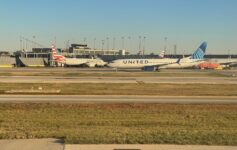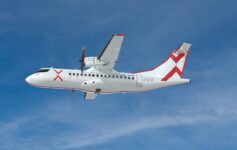The issue of how to approach a POS (passenger of size) is always a delicate one. As the debate rages over how much personal control some obese people really have over their weight, it is important to approach this topic in a respectful tone. How an airline should deal with an obese person is not easy ascertainable–especially when the plane is full. One thing is clear, though: by ignoring the problem it does not go away. US Airways should keep that in mind.
Arthur Berkowitz, 57, was forced to stand during the entire U.S. Airways flight from Anchorage to Philadelphia, one of the longest domestic flights offered by the airline, because of the size of an obese fellow passenger…The incident happened back in July 2011, but Berkowitz has only recently decided to speak out, upset after receiving only a $200 voucher from U.S. Airways.
I could turn this into a post bashing US Airways for their cheap compensation, but I will save that for another time. Instead, the key here is that a passenger was unable to sit in his seat without being subjected to severe discomfort (though flying in economy class on US Airways even with an open seat next to you is tough enough already…) and the airline did nothing about it.
Berkowitz was already seated on the aircraft when his fellow passenger, a late arrival, sat down next to him. The man was over 400 pounds, and Berkowitz says he spilled over into the adjacent seat, filling half of it. “His size required both armrests to be raised up and allowed for his body to cover half of my seat,” he said…
All the seats on the airplane were full, and he was barred from the flight attendants’ jump seats, which were vacant, because of U.S. Airways regulations.
Berkowitz was forced to stand in the aisle and galley area for the duration of the seven hour flight. He didn’t have a seat belt on from the moment the U.S. Airways plane took off in Anchorage, Alas. to when it landed in Philadelphia, Penn.
If true, this incident is not only a safety violation, but cruel and unusual punishment. Here is how I would approach dealing with POS:
1.) If the flight is not full, give them two seats
2.) If the flight is full, offer them two seats on the next available flight or the chance to immediately confirm an extra seat on the next flight (should space be available) at the same price the POS paid for his other ticket
I am certainly open to suggestions on how best to deal with POS, but just letting them board and take up 1.5 seats while essentially telling the passenger “tough luck” who is left with half a seat is just not fair. From an equity perspective, giving anyone a second seat on a complimentary basis may not be fair, but let’s be reasonable–think of yourself in the shoes of a POS. Let’s not forget it was not the POS who was at fault:
But Berkowitz, who has been flying U.S. Airways for 50 years, places almost no blame with the passenger, who he says behaved like a gentleman and was very sorry for inconveniencing him.
“The first thing he said to me was: ‘I want to apologize. I’m your worst nightmare,'” Berkowitz said.
Worst nightmare indeed.
We probably would not have heard about this story had US Airways been a bit more generous in compensating Mr. Berkowitz, but I am glad this story has surfaced–while dealing with POS is not easy, there are much better ways to dealing with these passengers then by ignoring them.




I’m presuming that you don’t know that the acronym POS is frequently used to refer to something that is a piece of something not nice? Perhaps a different method of referring to overly large passengers is in order.
I do feel bad for him. The GA’s should have not allowed the ‘person of size’ to board since they would have known that he was not going to fit in one seat. It’s not that hard to guess whether or not a person who weights 400+ lbs. is going to fit into a Y seat. He should have been placed on the next flight or a connecting flight that would have two seats available (either being charged or not depending on the GA).
I think Mr. Berkowitz deserves a good amount of compensation…
At the very least, the overweight person should have taken turns standing. Also, if he knew he was going to be someone’s “worst nightmare” then he should have bought a business class seat in advance or two coach seats. The airline could prevent this by requiring individuals over a certain weight to buy 2 coach seats or to buy a business class ticket. If they can charge for lap children on international flights, I see no reason they can’t do this.
I have a speech semi-rehearsed in my head in case such a situation were to happen to me. It basically revolves around calmly and politely contacting the FAs before take off and saying that I cannot safely sit in my seat if the passenger next to me cannot keep the armrest lowered. (Fortunately IIRC that’s in the UA contract of carriage, so I’ve got that on my side when I’m flying them)
As for the PoS of themselves, I’ve got to say that Southwest (I can’t believe I’m complimenting Southwest) has the best policy out there. It requires the person to buy an extra seat at the time of purchase, and if the flight goes out less than full (as it does most of the time), their second seat is automatically refunded. Makes sense to me.
Almost as bad as having to stand for a 13-hour flight from IAD to NRT because i couldn’t even fit my legs behind the seat in front of me. Premium economy was empty as was business, but I was denied a paid or complimentary upgrade. I swore off ANA for y-class ever again for an international flight.
By the way, it only took 9 tries to get my post to work through this terrible code verification system.
I agree with LarryInNYC above [though I presume Matthew is smart enough to know the ‘other’ definition of POS]. Although the three-letter acronym POS is allowed to have multiple definitions, let’s face it – in reality most folks think of the more derogatory one that Larry alludes to above. If this discussion is going to have a respectful tone [and I agree with Matthew that it should], I think the frequent flyer community should come up with another way to refer to passengers of size instead of using the acronym POS.
For better or worse, the terminology Passengers of Size and the resulting acronym POS are in use throughout the frequent flyer community and airline industry – including in the US Airways official statement on this matter. At some point there is always going to be an overlap between 3-letter acronyms, and I can think of a handful of other things POS stands for.
In a lot of ways, taking a respectful tone means looking past the circumstantial overlap in acronyms and ignoring it, rather than hunting around for some other term.